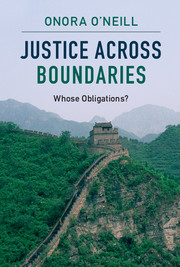Book contents
- Frontmatter
- Contents
- Acknowledgements
- Introduction
- Part I HUNGER ACROSS BOUNDARIES
- Part II JUSTIFICATIONS ACROSS BOUNDARIES
- Part III ACTION ACROSS BOUNDARIES
- 8 From Edmund Burke to twenty-first-century human rights: abstraction, circumstances and globalisation
- 9 From statist to global conceptions of justice
- 10 Global justice: whose obligations?
- 11 Agents of justice
- 12 The dark side of human rights
- Part IV HEALTH ACROSS BOUNDARIES
- Index
12 - The dark side of human rights
from Part III - ACTION ACROSS BOUNDARIES
Published online by Cambridge University Press: 05 February 2016
- Frontmatter
- Contents
- Acknowledgements
- Introduction
- Part I HUNGER ACROSS BOUNDARIES
- Part II JUSTIFICATIONS ACROSS BOUNDARIES
- Part III ACTION ACROSS BOUNDARIES
- 8 From Edmund Burke to twenty-first-century human rights: abstraction, circumstances and globalisation
- 9 From statist to global conceptions of justice
- 10 Global justice: whose obligations?
- 11 Agents of justice
- 12 The dark side of human rights
- Part IV HEALTH ACROSS BOUNDARIES
- Index
Summary
In his Reflections on the Revolution in France Edmund Burke asks
What is the use of discussing a man's abstract right to food or medicine? The question is upon the method of procuring and administering them. In that deliberation I shall always advise to call in the aid of the farmer and the physician rather than the professor of metaphysics.
Burke's question is sharp. What is the point of having a right? More specifically what is the point of having an abstract right, unless you also have a way of securing whatever it is that you have a right to? Why should we prize natural or abstract rights if there is no way of ensuring their delivery? And if we need to secure their delivery, are not ‘the farmer and the physician’ not merely of greater use than abstract or natural rights, but also of greater use than positive rights to claim food or medicine? For a hungry person, positive and justiciable rights to food are to be sure better than abstract rights that are not justiciable: but those who know how to grow, harvest, store and cook food are more useful, and having the food is better still. When we are ill, positive and justiciable rights to health care are to be sure better than abstract rights that are not justiciable: but skilled doctors and nurses are more useful, and receiving their care better still.
In a way it is surprising to find Burke discussing abstract rights to food or health care, for these presumed rights came to full prominence only in the late twentieth century. They are commonly called welfare or social rights, and contrasted with liberty rights. This, I think, is a misnomer. The salient feature of these rights is not that they contribute to the welfare of the recipient (although they are likely to do so), but that they are rights to goods or services. If there are to be rights to goods or services, those goods and services must be provided, and more specifically provided by someone – for example, by the farmer and the physician.
Most of the abstract rights against which Burke campaigned were the rights proclaimed in the Declaration of the Rights of Man and of the Citizen of 1789 (Declaration of 1789). They are what we now call liberty rights.
- Type
- Chapter
- Information
- Justice across BoundariesWhose Obligations?, pp. 193 - 208Publisher: Cambridge University PressPrint publication year: 2016

